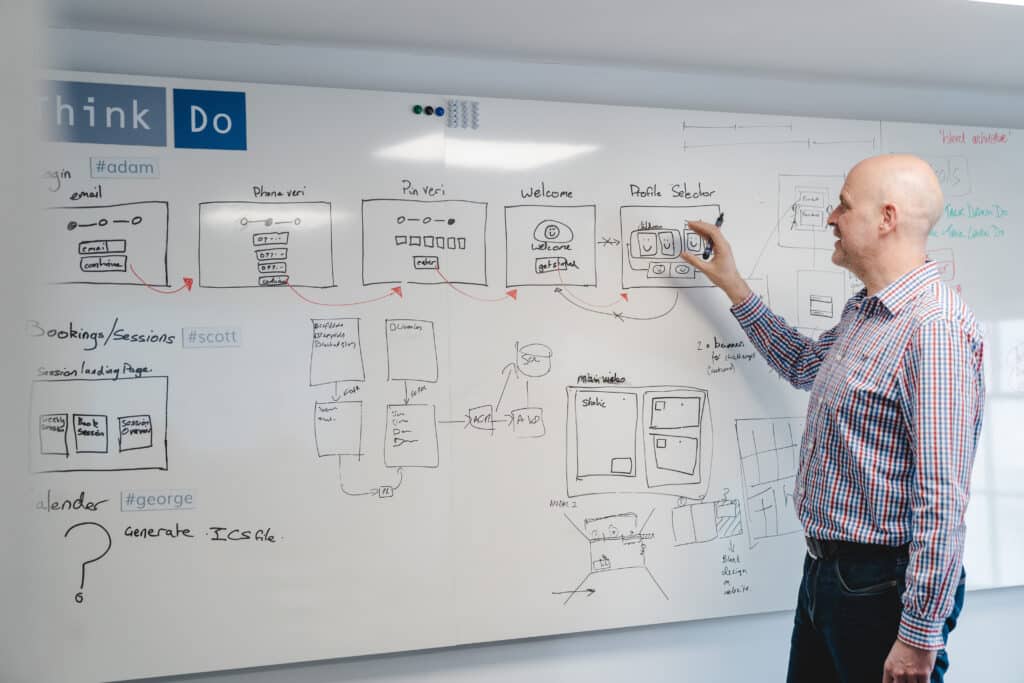Generative AI: Transforming Software & Product Delivery Across Businesses

Code documentation, generation, and refactoring tasks can all be completed faster with generative AI (GenAI). I’m already seeing the significant shift in how software developers and product delivery managers are working — which is definitely promising.
However, research and experience both tell us that AI tools still struggle to deliver when it comes to more complex tasks. What’s more, many off-the-shelf tools have blurry or inadequate boundaries around data protection, storage, and privacy. So while generative GenAI has already changed the product delivery process, we can certainly expect it to change further.
In this article, I’ll be exploring the direct impact of GenAI on software and product delivery, and consider what businesses can do to ensure they are getting the most out of GenAI in 2024.
Suggested reading: Read our free eBook, ‘AI Use Cases for Education Publishers’, to get insight into how generative AI can be applied in the education sector.
The impact of GenAI on software and product delivery
GenAI can be used across the whole product delivery cycle, from planning and design to implementation and integration. Developers report feeling happier when using AI, with an improved focus on producing satisfying and meaningful work. The potential long-term benefits are clear.
Here are just a few ways I’ve noticed GenAI is already transforming the product delivery process:
Advanced search functionalities
One factor about sectors like education, finance, and healthcare that has stood out to me during Talk Think Do’s work with our clients is that they often have incredibly large databases, making it difficult to search for specific information.
Public search engines such as Bing have already begun implementing OpenAI tools to provide users with more accurate search results for ambiguous queries. I’ve also seen how AI deep search can be effectively applied to internal data sets, helping employees quickly search for and locate information even if they don’t match the exact search terms.
However, businesses should be careful that whichever search tool they use or create has the necessary data protection measures in place; after all, it will have to access all of your and your clients’ data. Essential security measures include:
- Integrated incident response and recovery
- Centralised access management
- Data encryption
Content and code generation
Code generation is one of the most commonly touted benefits of GenAI, and for good reason. GenAI can quickly produce boilerplate code, adapting to different coding styles and increasing the efficiency of software development and testing stages.
I’ll let the numbers speak for themselves here: developers using GenAI tools are 25–30% more likely to be able to complete complex tasks in the same time frame as those without.
While AI is no replacement for human engineers, and continues to require oversight to ensure its accuracy, its code generation capabilities may help to plug the gap caused by the UK’s tech skills shortage. Software engineering vacancies hit 11,000 in 2022, and trends in computer science uptake in schools suggest that this shortage may persist in the long term.
GenAI can be similarly used in non-coding contexts, like:
- Creating or repurposing social media posts, web articles, and other online content
- Compiling data summaries for human review
- Producing educational assessment content
When considering a code or content generation solution, keep in mind that most off-the-shelf AI tools won’t be specialised enough to ensure optimal performance on your specific database, and may also lack the necessary context to provide engineers with relevant results. If you’re looking for performance and cost-efficiency, working with an innovative tech partner to build custom AI solutions is generally recommended.
Backend process automation
Slow backend processes can be a huge drain on a business’s time, energy, and resources. In my experience, most businesses are not inhibited by the cost of automation tools, but by uncertainties about where to deploy them. GenAI-powered automation allows businesses to:
- Identify deployment opportunities: The very process of identifying opportunities for automation can be performed by AI, using insights derived from your business’s data.
- Improve efficiency: Automating repetitive tasks with AI software allows your team to focus on more complex tasks.
- Reduce risk: Robotic Process Automation (RPA) tools often lack the nuance to effectively automate all backend processes, potentially leaving systems open to risks such as non-compliance. AI can intelligently identify risks, and, when required, flag them for human review.
Reviewing and refining content
AI can be used in the final stages of software or product development to review content according to predefined requirements.
Not only can businesses scan their data against GDPR, industry-specific regulations, and health and safety requirements, they can also assess it against customised rules that are unique to their organisation. In an education publishing context, for example, this could mean scanning assessment content against organisation-specific accessibility and diversity targets, using data to improve learning outcomes.
Pro tip: Ensuring that AI is used in conjunction with human operators is paramount for complete compliance and data security.
Improved collaboration
GenAI-powered technology has a high level of semantic understanding, allowing users to input human-readable prompts and receive relevant, human-readable outputs.
In this way, AI serves to enhance the skills and capabilities of human teams by improving the connection between product developers, architects, engineers, and operations managers.
Suggested reading: Learn more about the benefits of custom AI solutions on our Generative AI Development page.
The importance of effective implementation
According to a recent study, 82% of organisations currently considering or using GenAI believe it will either significantly change or transform their industry. But the impact of AI on an organisation depends entirely on how it is implemented.
The risks of poor AI implementation include:
- Technical debt: Caused by overly rampant code generation, this can quickly escalate into high costs and more complex long-term maintenance.
- AI bias: Small inconsistencies or biases in your system may be amplified by AI. Identifying and isolating them as far as possible is essential to maintaining the integrity of new or repurposed content created by GenAI.
- Limited transparency: Big data, ineffective storage solutions, and complex data management tools can all contribute to limited transparency in the results you receive from your GenAI tool. This lack of visibility could lead to risks or system errors being missed.
- Poor ROI: Although off-the-shelf GenAI tools come at a range of price points, the value they provide for your organisation will depend on how effectively they solve your business challenges. A poor-fit solution could quickly become a drain on resources.
If you’ve chosen to implement an off-the-shelf GenAI tool, make sure to consider the following key questions:
- Is it compatible with your existing system, or are you willing to adapt your system to accommodate it?
- Do you have the physical infrastructure to maintain it in the long term?
- Do you have the technical staff to maintain it in the long term?
- Does it help you overcome a specific business challenge(s)?
If the answer to any of these questions is no, it may be worth thinking further about the benefits of a custom GenAI solution.
AI: The future of product delivery
As any product delivery manager will know, products are only viable if they solve the problem of the potential buyer — and this is no different when it comes to AI.
With hundreds of new GenAI tools flooding the market, it’s imperative that businesses invest in solutions that serve their unique requirements. This could mean finding an industry-specific tool that fits the bill, or, better yet, investing in a custom-build solution.
Custom-built tools will generally provide better long-term results, and are well-suited to businesses with limited in-house technical expertise who may need support preparing their database for implementation.
Stay one step ahead with a custom-built AI solution
At Talk Think Do, our team has been utilising generative AI tools such as GitHub Copilot and OpenAI GPT to craft custom solutions that help our clients improve efficiency, boost performance, and drive innovation.
We follow an in-depth discovery process to understand your business and the challenges it is facing, and subsequently tailor your GenAI solution according to specific security, compliance, and industry requirements.
I’m excited to see how GenAI will continue to take the world of software and product delivery forward — and am proud that Talk Think Do is paving the way. If you’d like to know about what we do and how we could support your business, you can book a no-obligation consultation to discuss your data needs with a member of our team.
Get access to our monthly
roundup of news and insights
You can unsubscribe from these communications at any time. For more information on how to unsubscribe, our privacy practices, and how we are committed to protecting and respecting your privacy, please review our Privacy Policy.
See our Latest Insights
Shipping AI in the Real World: Lessons From Our Latest Cycle
AI moves pretty fast. If you don't stop and look around once in a while, you could miss it. Recognising this, we have been running a structured approach to AI adoption for production systems. A critical element is ensuring we keep up with the latest approaches while retaining safety, responsibility and avoiding inefficiencies cause by...
Working as One Team: How Our Business Analysts Bridge Vision and Delivery
When clients partner with us, they often expect engineers and designers. But one of the most powerful roles behind a successful digital product is often less visible: the Business Analyst (BA). At Talk Think Do, BAs aren’t just requirement-gatherers. We’re connectors, between vision and execution, users and features, partners and platforms. In the recent delivery…
Implementing RAG AI Search on On-Premise Files with our AI Search Accelerator
As demand for AI‑powered tools like Microsoft Copilot grows, many organisations are asking the same question: “How can we harness the power of generative AI without moving our sensitive data to the cloud?” In this guide, we’ll explain why Retrieval‑Augmented Generation (RAG) is so effective for on‑premise data and walk through a practical approach using…
Legacy systems are costing your business growth.
Get your free guide to adopting cloud software to drive business growth.




